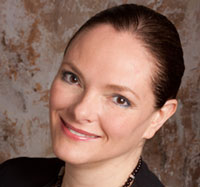– Psychoanalysis and Holocaust Testimony: Unwanted Memories of Social Trauma
Irit Felsen
– Relational Dance Movement Psychotherapy: A New Old Idea
Sissy Lykou
– Courageous Drawings of Vigilant Ambiguities
Noreen O’Connor
Psychoanalysis and Holocaust Testimony: Unwanted Memories of Social Trauma
Chapter and book announcement by Irit Felsen (USA)
I am very pleased to announce a new book, entitled Psychoanalysis and Holocaust Testimony: Unwanted Memories of Social Trauma, edited by Dori Laub and Andreas Hamburger, and published last April by Routledge.

Andreas Hamburger
This book, in which I have published two chapters, is based on research that Dori Laub, MD, and I did, in which we interviewed chronically hospitalized Holocaust survivors in psychiatric institutions in Israel. In addition to the chapters written by Dori Laub and myself, there are contributions by others who offer their analyses and perspectives.
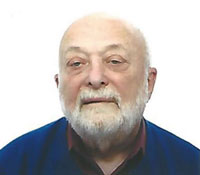
Dori Laub
The purpose of the book was to closely examine the experience of denial, erasure, and fragmentation inherent in the attempt to think, verbalize, and speak about extreme traumatization. Questions about bearing witness and giving testimony, as well as about the role of denial on the individual and on the societal levels, are examined. The impact of traumatic narratives and society’s difficulty in hearing them manifest in such phenomena as the “disappearance” from visibility of the most injured survivors and from social awareness of the existence of this group, as well as the omission of their life stories from the collective narratives of the Holocaust. In other places around the world the refusal of society to bear witness, to accept responsibility for the victims, and to bring perpetrators and collaborators to justice, is evidenced in the repeated denial of genocides, also evidenced in the attempts to deny the Holocaust. This book is will appeal to, among others, professionals working with trauma survivors. My own two chapters are written for both professional and non-professional readers.
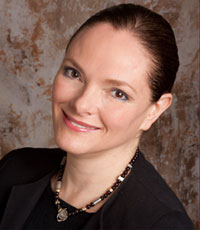 Irit Felsen, PhD
Irit Felsen, PhD
420 Boulevard
Mountain Lakes, NJ 07046 USA
157 Engle Street
Englewood, NJ 70631 USA
Email Irit Felsen
![]()
Relational Dance Movement Psychotherapy: A New Old Idea
Chapter Announcement by Sissy Lykou (UK)
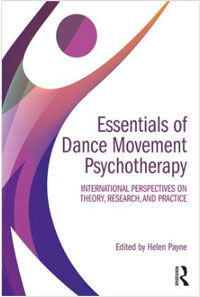 Sissy Lykou recently published her chapter, “Relational Dance Movement Psychotherapy: A New Old Idea,” in Helen Payne’s edited volume Essentials of Dance Movement Psychotherapy: International Perspectives on Theory, Research, and Practice (Routledge, 2017).
Sissy Lykou recently published her chapter, “Relational Dance Movement Psychotherapy: A New Old Idea,” in Helen Payne’s edited volume Essentials of Dance Movement Psychotherapy: International Perspectives on Theory, Research, and Practice (Routledge, 2017).
The main focus is on tripartite connections between (a) relational psychoanalysis, (b) contemporary person-centered psychotherapy, and (c) relational body psychotherapy, then linking the resulting integration with the theory and practice of Dance Movement Psychotherapy (DMP).
The first part of the chapter follows the traditions of the relational psychoanalytic and humanistic schools that see the therapist enhancing the therapeutic alliance by taking risks, while also highlighting how the therapist carries his/her own kinetic and emotional baggage. Then there is the impact on therapy of the client being seen as an active self-healer, maintaining his/her own power, with the potential to move concern for others into a wider set of social and cultural concerns, and becoming an “activist” client. The overall focus is on the client-therapist dyad and how both are active in, and co-creators of, the therapeutic relationship.
The second part explores the way in which non-verbal exchanges (i.e. our embodied communication) can be the relational vehicle for the co-creation of a therapeutic alliance. Relationality and embodiment are seen through intrapsychic, interpersonal, and world-oriented lenses.
The third part highlights the process in which embodied movement in the therapeutic relationship inspires awareness of the performative aspect of relationships. The differences between embodied, somatic, and kinetic countertransferences are defined and illustrated with cases.
 Sissy Lykou, MA, PGCert is a UKCP registered psychotherapist and an ADMP UK registered dance movement psychotherapist who trained as a counseling psychologist in Greece. She practices in London privately and in community psychotherapy projects for children under five years of age and their parents/carers. She lectures on several university and professional training programs in the UK and Europe. She has worked on EU research projects at the Universities of Heidelberg and Athens. In addition to publishing papers and chapters, she serves on journal editorial boards, was a member of the Steering Group of Psychotherapists and Counselors for Social Responsibility and coordinates the therapists’ community at Stillpoint Spaces London.
Sissy Lykou, MA, PGCert is a UKCP registered psychotherapist and an ADMP UK registered dance movement psychotherapist who trained as a counseling psychologist in Greece. She practices in London privately and in community psychotherapy projects for children under five years of age and their parents/carers. She lectures on several university and professional training programs in the UK and Europe. She has worked on EU research projects at the Universities of Heidelberg and Athens. In addition to publishing papers and chapters, she serves on journal editorial boards, was a member of the Steering Group of Psychotherapists and Counselors for Social Responsibility and coordinates the therapists’ community at Stillpoint Spaces London.
Sissy Lykou, MA, PGCert
Email Sissy Lykou
Website: www.lykoucounselling.co.uk
Website: www.london.stillpointspaces.com
![]()
Courageous Drawings of Vigilant Ambiguities
Chapter Announcement by Noreen O’Connor (UK)
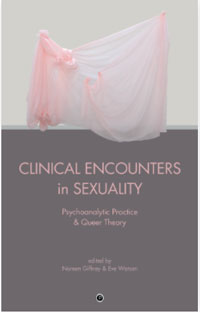 Clinical Encounters in Sexuality, edited by Noreen Giffney and Eve Watson (Punctum Books, 2017), makes an intervention into the fields of clinical psychoanalysis and sexuality studies, in an effort to think about a range of issues relating to sexuality from a clinical psychoanalytic perspective. The book concentrates on a number of concepts, namely identity, desire, pleasure, perversion, ethics, and discourse. The aim of my chapter is to elucidate ways in which analysts have responded to the challenges of queer theorists. Working with the operative distinction of analyst and queer theorist I draw out their shared vigilance of reductive classifications of foundational aesthetic, epistemic, ontological, and ethico-political specifications of subjective/intersubjective relationships.
Clinical Encounters in Sexuality, edited by Noreen Giffney and Eve Watson (Punctum Books, 2017), makes an intervention into the fields of clinical psychoanalysis and sexuality studies, in an effort to think about a range of issues relating to sexuality from a clinical psychoanalytic perspective. The book concentrates on a number of concepts, namely identity, desire, pleasure, perversion, ethics, and discourse. The aim of my chapter is to elucidate ways in which analysts have responded to the challenges of queer theorists. Working with the operative distinction of analyst and queer theorist I draw out their shared vigilance of reductive classifications of foundational aesthetic, epistemic, ontological, and ethico-political specifications of subjective/intersubjective relationships.
Relational thrownness into the implicit and explicit and conscious-unconscious resourcefulness of our common language(s) draws us out of the obsessionality of our egocentricity and moves us towards openness to the unexpected. I specify the originality emergent in analytic speaking/responding as the an-archic dynamism of psychoanalysis. The “face-to-face” is a saying that in being said breaks, at each moment, the definition of that which it says, thus resisting totalization.
Link to the publisher: https://punctumbooks.com/titles/clinical-encounters-in-sexuality-psychoanalytic-practice-and-queer-theory/
About the Author:
 I am a relational psychoanalytic psychotherapist who has practiced in North London for thirty years. I have a PhD in Contemporary European Philosophy (NUI, Cork). I served on training committees for psychoanalytic training in London for eleven years, teaching and supervising trainees, and I supervise qualified analysts. I have lectured in universities and publicly in philosophy and psychoanalysis in Ireland and the UK. I am co-author (with Joanna Ryan) of Wild Desires and Mistaken Identities: Lesbianism and Psychoanalysis (London: Karnac, 2003) and (with Mary Lynne Ellis) of Questioning Identities; Philosophy in Psychoanalytic Practice (London: Karnac, 2010).
I am a relational psychoanalytic psychotherapist who has practiced in North London for thirty years. I have a PhD in Contemporary European Philosophy (NUI, Cork). I served on training committees for psychoanalytic training in London for eleven years, teaching and supervising trainees, and I supervise qualified analysts. I have lectured in universities and publicly in philosophy and psychoanalysis in Ireland and the UK. I am co-author (with Joanna Ryan) of Wild Desires and Mistaken Identities: Lesbianism and Psychoanalysis (London: Karnac, 2003) and (with Mary Lynne Ellis) of Questioning Identities; Philosophy in Psychoanalytic Practice (London: Karnac, 2010).
Noreen O’Connor, PhD
78a Huddleston Road
London N7 0EG UK
Email Noreen O’Connor

